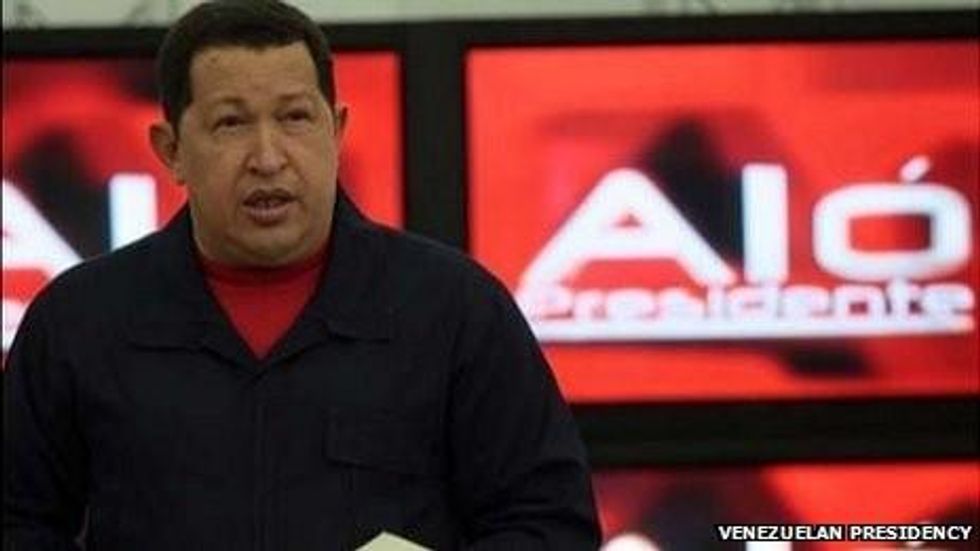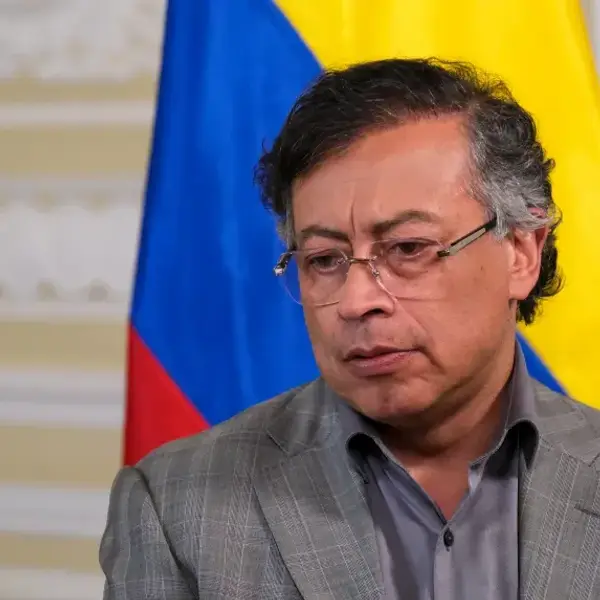On Media Bias in Venezuela
Everywhere you look, there are people who are taking seriously the claim that Venezuelan President Hugo Chavez has a big media advantage over the opposition in the upcoming elections. The Committee to Protect Journalists, in their latest report [PDF] on Venezuela, states that "a vast state media presence echoes the government's positions," and refers to the government as having a "media empire."
Everywhere you look, there are people who are taking seriously the claim that Venezuelan President Hugo Chavez has a big media advantage over the opposition in the upcoming elections. The Committee to Protect Journalists, in their latest report [PDF] on Venezuela, states that "a vast state media presence echoes the government's positions," and refers to the government as having a "media empire."

From the Wilson Center's latest report [PDF], we read: "Media coverage is not even moderately balanced. . . . In television, the government's predominance is overwhelming; it was estimated that by 2007 it controlled seven national television channels and 35 open community channels."
These statements are false and misleading, but they are adopted uncritically in almost all mainstream media coverage. In fact, state TV had about 5.9 percent of the audience that watches television in Venezuela in 2009-2010. These data were gathered by AGB Panamericana de Venezuela Medicion S.A., a local affiliate of Nielsen Media Research International, and are probably as reliable as Nielsen ratings in the United States. The data were collected through equipment boxes placed in each home, measuring minutes of each channel watched. A representative sample of 1000 households was constructed and data were gathered over ten years.
Thus, the above statements are similar to claiming that PBS TV, the public TV in the U.S., dominates broadcast TV in the United States. Most of the major newspapers (e.g., El Nacional, El Universal) are also strongly against the government. According to CONATEL data, only about 14 percent of radio is publicly owned; and since there is more strongly anti-government radio in Venezuela than TV, the opposition almost certainly has more advantage in radio than in other media.
Chavez, of course, regularly does cadenas - speeches which interrupt regular TV programming. But it is difficult to judge whether these speeches can balance the overwhelming media bias against the government.
There are also polling data indicating that the private, opposition media's dominance in Venezuela has a significant influence on political beliefs. For example, an Associated Press-Ipsos poll conducted in November 2006, just before the last presidential election, showed that "57 percent of respondents were at least somewhat concerned that people could face reprisals for how they vote," with only 42 percent "very confident their votes would be kept secret." This was a theme repeatedly transmitted through opposition media. In fact, there is a secret ballot and it is no more possible for the government to know how someone voted in Venezuela than it is in the United States, Germany, or Sweden.
The misrepresentation of the media is part of the ongoing gross misrepresentation of Venezuela throughout media and foreign policy circles, which has reached the point where almost anything can be said about Venezuela and remain unchallenged, so long as it is negative.
An Urgent Message From Our Co-Founder
Dear Common Dreams reader, The U.S. is on a fast track to authoritarianism like nothing I've ever seen. Meanwhile, corporate news outlets are utterly capitulating to Trump, twisting their coverage to avoid drawing his ire while lining up to stuff cash in his pockets. That's why I believe that Common Dreams is doing the best and most consequential reporting that we've ever done. Our small but mighty team is a progressive reporting powerhouse, covering the news every day that the corporate media never will. Our mission has always been simple: To inform. To inspire. And to ignite change for the common good. Now here's the key piece that I want all our readers to understand: None of this would be possible without your financial support. That's not just some fundraising cliche. It's the absolute and literal truth. We don't accept corporate advertising and never will. We don't have a paywall because we don't think people should be blocked from critical news based on their ability to pay. Everything we do is funded by the donations of readers like you. Will you donate now to help power the nonprofit, independent reporting of Common Dreams? Thank you for being a vital member of our community. Together, we can keep independent journalism alive when it’s needed most. - Craig Brown, Co-founder |
Everywhere you look, there are people who are taking seriously the claim that Venezuelan President Hugo Chavez has a big media advantage over the opposition in the upcoming elections. The Committee to Protect Journalists, in their latest report [PDF] on Venezuela, states that "a vast state media presence echoes the government's positions," and refers to the government as having a "media empire."

From the Wilson Center's latest report [PDF], we read: "Media coverage is not even moderately balanced. . . . In television, the government's predominance is overwhelming; it was estimated that by 2007 it controlled seven national television channels and 35 open community channels."
These statements are false and misleading, but they are adopted uncritically in almost all mainstream media coverage. In fact, state TV had about 5.9 percent of the audience that watches television in Venezuela in 2009-2010. These data were gathered by AGB Panamericana de Venezuela Medicion S.A., a local affiliate of Nielsen Media Research International, and are probably as reliable as Nielsen ratings in the United States. The data were collected through equipment boxes placed in each home, measuring minutes of each channel watched. A representative sample of 1000 households was constructed and data were gathered over ten years.
Thus, the above statements are similar to claiming that PBS TV, the public TV in the U.S., dominates broadcast TV in the United States. Most of the major newspapers (e.g., El Nacional, El Universal) are also strongly against the government. According to CONATEL data, only about 14 percent of radio is publicly owned; and since there is more strongly anti-government radio in Venezuela than TV, the opposition almost certainly has more advantage in radio than in other media.
Chavez, of course, regularly does cadenas - speeches which interrupt regular TV programming. But it is difficult to judge whether these speeches can balance the overwhelming media bias against the government.
There are also polling data indicating that the private, opposition media's dominance in Venezuela has a significant influence on political beliefs. For example, an Associated Press-Ipsos poll conducted in November 2006, just before the last presidential election, showed that "57 percent of respondents were at least somewhat concerned that people could face reprisals for how they vote," with only 42 percent "very confident their votes would be kept secret." This was a theme repeatedly transmitted through opposition media. In fact, there is a secret ballot and it is no more possible for the government to know how someone voted in Venezuela than it is in the United States, Germany, or Sweden.
The misrepresentation of the media is part of the ongoing gross misrepresentation of Venezuela throughout media and foreign policy circles, which has reached the point where almost anything can be said about Venezuela and remain unchallenged, so long as it is negative.
Everywhere you look, there are people who are taking seriously the claim that Venezuelan President Hugo Chavez has a big media advantage over the opposition in the upcoming elections. The Committee to Protect Journalists, in their latest report [PDF] on Venezuela, states that "a vast state media presence echoes the government's positions," and refers to the government as having a "media empire."

From the Wilson Center's latest report [PDF], we read: "Media coverage is not even moderately balanced. . . . In television, the government's predominance is overwhelming; it was estimated that by 2007 it controlled seven national television channels and 35 open community channels."
These statements are false and misleading, but they are adopted uncritically in almost all mainstream media coverage. In fact, state TV had about 5.9 percent of the audience that watches television in Venezuela in 2009-2010. These data were gathered by AGB Panamericana de Venezuela Medicion S.A., a local affiliate of Nielsen Media Research International, and are probably as reliable as Nielsen ratings in the United States. The data were collected through equipment boxes placed in each home, measuring minutes of each channel watched. A representative sample of 1000 households was constructed and data were gathered over ten years.
Thus, the above statements are similar to claiming that PBS TV, the public TV in the U.S., dominates broadcast TV in the United States. Most of the major newspapers (e.g., El Nacional, El Universal) are also strongly against the government. According to CONATEL data, only about 14 percent of radio is publicly owned; and since there is more strongly anti-government radio in Venezuela than TV, the opposition almost certainly has more advantage in radio than in other media.
Chavez, of course, regularly does cadenas - speeches which interrupt regular TV programming. But it is difficult to judge whether these speeches can balance the overwhelming media bias against the government.
There are also polling data indicating that the private, opposition media's dominance in Venezuela has a significant influence on political beliefs. For example, an Associated Press-Ipsos poll conducted in November 2006, just before the last presidential election, showed that "57 percent of respondents were at least somewhat concerned that people could face reprisals for how they vote," with only 42 percent "very confident their votes would be kept secret." This was a theme repeatedly transmitted through opposition media. In fact, there is a secret ballot and it is no more possible for the government to know how someone voted in Venezuela than it is in the United States, Germany, or Sweden.
The misrepresentation of the media is part of the ongoing gross misrepresentation of Venezuela throughout media and foreign policy circles, which has reached the point where almost anything can be said about Venezuela and remain unchallenged, so long as it is negative.

